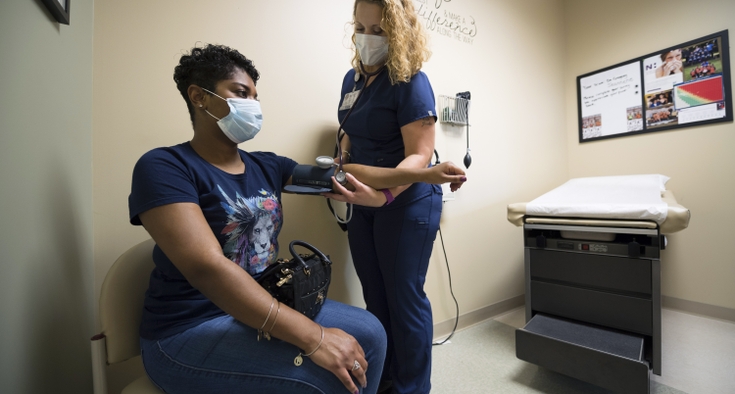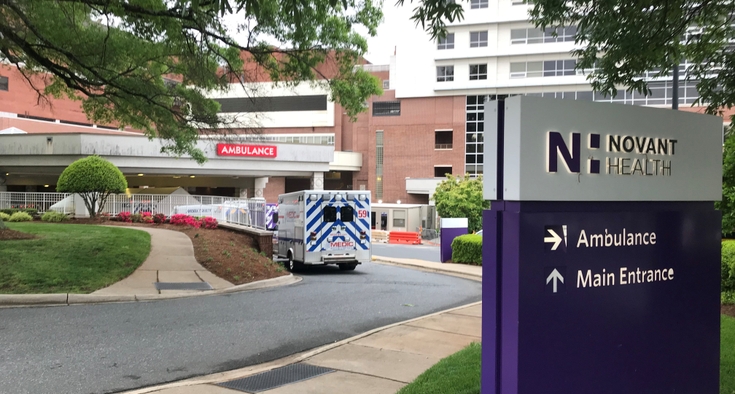Shannon Fitzgerald woke up on April 21 with pain like she’d never had before. She roused her husband, Tim Wood, to tell him about it.
“Do you want an Advil?” he asked.
Her response: “This is so much worse than Advil!”
They laugh about it now, but there was nothing funny that morning. “I’ve had UTIs,” Fitzgerald said. “Those are painful – but nothing like this.” This was ER-level pain. And yet, the couple was reluctant to go. Wood has rheumatoid arthritis and other autoimmune conditions, and he and Fitzgerald both feared a waiting room filled with sick people, including potential COVID-19 patients. (Novant Health ER visitors will never experience lobbies filled with coronavirus patients. See below.)
Although hesitant, Fitzgerald decided she couldn’t wait. Her husband said, “I’m picturing how the ER looked the last time we were there for an ulcerative colitis incident. Everyone was packed in, shoulder to shoulder.” It was a long wait to be seen.
“This,” Wood said of their recent visit, “was the exact opposite.”

They pulled into Novant Health Matthews Medical Center ER at about 7:15 a.m., Wood dropped his wife at the door, grabbed a parking spot, put on his mask and walked inside. “In the time it took me to park the car, they had already finished Shannon’s intake process,” he said.
From behind a clear shield, a team member told Wood he wouldn’t be able to accompany his wife to a treatment room due to COVID-19 restrictions. “We’ve never gone to the hospital without each other,” Wood said. “I hated the thought of Shannon being there by herself.”
“It was a relief for me that Tim couldn’t come in,” Fitzgerald said. “I had worried about his autoimmune condition.”
She had her vital signs checked and an IV administered. The next hour-and-a-half – when the painkiller Dilaudid was doing its work – is a blur for Fitzgerald. She recalls lots of nurses streaming in and out of her room to check on her. She remembers thinking: I just want to sleep. I hope no one comes back in.

Fitzgerald recalled being wheeled into a room for a scan, which revealed she had the kidney stone Dr. Jeff Warden suspected. “The worst is over,” he told her. The stone was 3 millimeters and one she could pass on her own. He prescribed anti-nausea medication and a painkiller.
He offered to prescribe Oxycontin, but I told him I was too nervous to take that,” Fitzgerald remembered. But Warden explained the small amount he was prescribing didn’t pose an addiction risk.
When the staff called Wood to say his wife was ready to be discharged, he drove around to pick her up. She was already standing outside, ready to go.
“I was so impressed with the whole experience,” Wood said. “There was just one other guy in the ER waiting room. Everyone had on a mask. Everyone was efficient. And Shannon got a lot of personal attention.”
The following week, Wood was in a business meeting with a Novant Health leader. He thanked him for the efficient and expert care his wife had gotten and remarked on the number of people who checked on her.
We know it’s hard for patients who can’t have family with them, Wood recalled him saying. So, Novant Health team members are trying to ensure no patient feels alone.
Fitzgerald has a message for anyone who’s feeling an intense pain but hesitant about an ER visit: “Just go.”
All ER visitors are screened for COVID-19 and suspected cases are immediately ushered to a separate treatment area for patient and team member safety, Warden explained."It's almost like there are two units. We're prepared for patients and take all the precautions we need to keep them safe and give them the care they need and deserve."
Only a few Novant Health medical centers have COVID-19 patients. And the vast majority of Novant Health hospital patients are there for non-coronavirus treatment.
Novant Health medical centers are safe and open for all patients. Delaying care for stroke and heart attack can be dangerous, even fatal. When serious symptoms arise, head to the emergency room.
Find a Novant Health emergency room.







